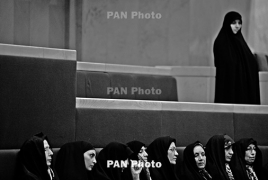Top EU court rules companies can ban wearing of religious symbols March 14, 2017 - 14:06 AMT PanARMENIAN.Net - The European Court of Justice has ruled that companies can ban employees from wearing the Islamic headscarf, but only as part of prohibitions including other religious symbols, The Independent reports. It is the first case of its kind amid a series of legal disputes over the right for Muslim women to wear the hijab at work. “An internal rule of an undertaking which prohibits the visible wearing of any political, philosophical or religious sign does not constitute direct discrimination,” the court said in a statement. “However, in the absence of such a rule, the willingness of an employer to take account of the wishes of a customer no longer to have the employer's services provided by a worker wearing an Islamic headscarf cannot be considered an occupational requirement that could rule out discrimination.” Two employees in Belgium and France had brought the case to the ECJ after being dismissed for refusing to remove their headscarves. The Belgian woman had been working as a receptionist for G4S Secure Solutions, which has a general ban on wearing visible religious or political symbols, while the French claimant is an IT consultant who was told to remove her headscarf after a client complained. The G4S dispute, which started in 2006, was originally based on an “unwritten rule” banning employees wearing signs of their political, philosophical or religious beliefs, but the company’s workplace regulations were updated after the woman started wearing a hijab. Although they apply to all beliefs, the ECJ said it was “not inconceivable” that such rules could be deemed discriminatory for indirectly targeting Islam over other religions. Authorities said a total of 192 Azerbaijani troops were killed and 511 were wounded during Azerbaijan’s offensive. In 2023, the Azerbaijani government will increase the country’s defense budget by more than 1.1 billion manats ($650 million). The bill, published on Monday, is designed to "eliminate the shortcomings of an unreasonably broad interpretation of the key concept of "compatriot". The earthquake caused a temporary blackout, damaged many buildings and closed a number of rural roads. Partner news |